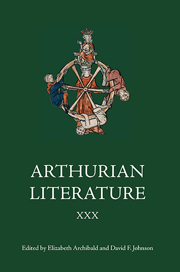Book contents
- Frontmatter
- Contents
- General Editors' Foreword
- List of Contributors
- I Magic and the Supernatural in Early Welsh Arthurian Narrative: Culhwch ac Olwen and Breuddwyd Rhonabwy
- II How Green was the Green Knight? Forest Ecology at Hautdesert
- III Edward III's Arthurian Enthusiasms Revisited: Perceforest in the Context of Philippa of Hainault and the Round Table Feast of 1344
- IV Pagan Gods and the Coming of Christianity in Perceforest
- V Malory's Sources for the Tale of the Sankgreal: Some Overlooked Evidence from the Irish Lorgaireacht an tSoidigh Naomhtha
- VI ‘Transmuer de rime en prose’: The Transformation of Chrétien de Troyes's Joie de la Cour episode in the Burgundian Prose Erec (1450–60)
- VII La Rétro-écriture ou l'écriture de la nostalgie dans le roman arthurien tardif: Ysaïe le Triste, Le Conte du Papegau et Mélyador de Froissart
- VIII Remembering Brutus: Aaron Thompson's British History of 1718
- Contents of Previous Volumes
III - Edward III's Arthurian Enthusiasms Revisited: Perceforest in the Context of Philippa of Hainault and the Round Table Feast of 1344
Published online by Cambridge University Press: 05 March 2014
- Frontmatter
- Contents
- General Editors' Foreword
- List of Contributors
- I Magic and the Supernatural in Early Welsh Arthurian Narrative: Culhwch ac Olwen and Breuddwyd Rhonabwy
- II How Green was the Green Knight? Forest Ecology at Hautdesert
- III Edward III's Arthurian Enthusiasms Revisited: Perceforest in the Context of Philippa of Hainault and the Round Table Feast of 1344
- IV Pagan Gods and the Coming of Christianity in Perceforest
- V Malory's Sources for the Tale of the Sankgreal: Some Overlooked Evidence from the Irish Lorgaireacht an tSoidigh Naomhtha
- VI ‘Transmuer de rime en prose’: The Transformation of Chrétien de Troyes's Joie de la Cour episode in the Burgundian Prose Erec (1450–60)
- VII La Rétro-écriture ou l'écriture de la nostalgie dans le roman arthurien tardif: Ysaïe le Triste, Le Conte du Papegau et Mélyador de Froissart
- VIII Remembering Brutus: Aaron Thompson's British History of 1718
- Contents of Previous Volumes
Summary
Perceforest is the greatest of the unread Arthurian romances. There is still no complete modern edition, and in order to read the last book, you have to use the huge folio volumes produced in Paris in the early sixteenth century, designed to satisfy the enthusiasm of buyers of the new-fangled romances in book form. Neglected until a summary version by Jeanne Lods appeared in 1951, it was only with the appearance of the first volume of the Textes littéraires français edition by Jane Taylor in 1979 that it began to attract wider attention among Arthurian scholars, reinforced by the publication of all but the sixth part of the romance by 2007. Now that Nigel Bryant has produced an English version, its extraordinary riches are available to a much wider audience. This article explores the possible historical context in which it was originally composed.
I say ‘originally composed’ deliberately, because the version that we have is almost certainly a reworking in the fifteenth century of a fourteenth-century prose romance. The language is not that of the mid fourteenth century, and much of the content is similar in style to that of the Burgundian romances of the mid fifteenth century. These were new versions of twelfth- and thirteenth-century texts, by now archaic in their language.
- Type
- Chapter
- Information
- Arthurian Literature XXX , pp. 55 - 74Publisher: Boydell & BrewerPrint publication year: 2013



